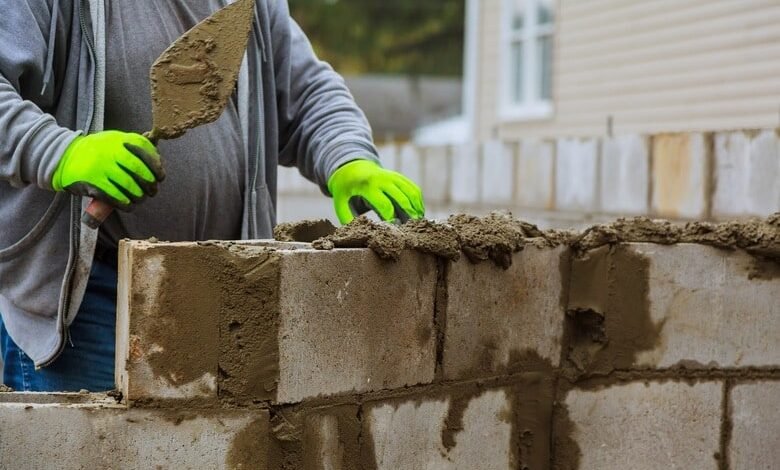Why is a Contractor Needed for Block Wall Repair?

Retaining walls rarely last a lifetime. People often feel like they should. Look at the pyramids in Egypt. They have lasted thousands of years and will probably last thousands more. Haven’t humans learned anything since those structures were built?
Many things can go wrong with a retaining wall. When constructing the pyramids, the Egyptians learned the stones must be cut accurately to prevent water from entering the joints. If water got into the joints, freeze-thaw would become an issue. Today, this same problem may lead to the need for block wall repair. However, it is only one of many things that can cause a block wall to fail.
Block walls fail when they are no longer able to hold the weight of the dirt they are designed to contain. The failure may be the result of shoddy construction. The weight of the soil and water could also damage the wall over time. This damage isn’t always apparent. but it weakens the wall. The following reasons are the main causes of block wall failure.
Inadequate Footings
A block wall will not remain standing if its foundation is not stable. The footings must be sized appropriately for the wall. When building a cinderblock wall, for example, the contractor needs to plan for footings twice the width of the wall. The added width of the footing ensures it can hold the weight of the wall.
At times, the foundation is adequate, but the ground underneath it is not stable. When the dirt or gravel under the wall shifts or isn’t properly compacted, the wall may fail. Finally, the blocks used for the foundation must be larger than the blocks used in the wall.
Drainage Issues
Every block wall requires adequate drainage to remain standing. When water cannot make its way out of the wall, it will find a way to do so. The water pushes against the wall, wearing it down. In addition, this water moves into the soil the wall supports. The soil increases in weight thanks to the added water, and this weight may be more than the block wall can hold. The wall then fails. This hydrostatic pressure may also cause the wall to bulge or crack.
Improper drainage can also lead to the need for frequent repairs. A property owner should call for help as soon as they suspect a drainage problem is affecting one or more block walls on the property. Quick action will help the property owner save money and provide the owner with peace of mind regarding the stability of the block wall.
Several solutions may be discussed to resolve drainage issues. The contractor might install a perforated pipe at the base of the inside wall. Another option involves creating weep holes in the wall to allow water to drain. Drainage issues can also be addressed when the contractor backfills the well.
Backfill Concerns
When backfilling the wall, the contractor must fill a minimum of 12″ of space behind the wall with gravel. This backfill differentiates the block retaining wall from other walls throughout the landscape. If the contractor fails to layer the backfill correctly, water won’t be able to move through the soil and new drainage issues will arise.
Building Materials
Contactors offer many materials today when a customer wishes to have a wall built on their property. Wood doesn’t hold up well over time. Railroad ties and boulders may also be used to construct a wall. However, many people today choose to use blocks for several reasons.
Block walls allow for a wide range of designs. The blocks are strong and resistant to damage, which means repairs won’t be as frequent. The wall, if properly constructed, will hold up in a flood, strong wind, or fire.
Added Weight
When designing a block wall, the contractor must know if the owner plans to put additional weight on top of the wall. The wall must be able to bear this weight or it will fail. For instance, a homeowner might decide to place heavy decorative statues on an existing block wall to change the look of the landscape. If the statutes are heavy and multiple are used, the wall is in danger of failing, as it wasn’t designed to support this weight.
Construction Errors
A homeowner might attempt to build a retaining wall without professional help. They must then call for a block wall repair when the wall fails. The homeowner might build this wall using information that is not accurate, or they may make a calculation error that leads to the early failure of the wall. Poor construction techniques can also lead to the wall failing. Working with a professional block wall contractor eliminates these worries.
Age Considerations
Everything breaks down with time. The pyramids in Egypt are being monitored, so these wonders aren’t lost to future generations. However, they are holding up well with time. That may not be the case with a block wall. The ground may shift over time, the weight of the backfill could lead to the blocks moving out of position, or the blocks may crack and crumble. Regular maintenance helps to catch these problems, early so steps can be taken to protect the wall.
Repairing a Block Wall
Several measures might be used to fix a block wall that is failing. The wall might need to be removed and reconstructed to level it. The subgrade could be failing and causing the wall to fail. The only way to resolve this issue is to remove the wall and fix the footing.
Before doing anything with the wall, the contractor will take pictures to learn exactly how it was. This picture will be used as a reference during the wall-rebuilding process. Having this guide reduces the amount of time needed to restore the wall to its original condition.
All blocks will be examined to ensure they are in good shape. Any failing blocks must be replaced. Replacing them will extend the lifespan of the wall while improving its appearance.
Once the wall has been dismantled, the subgrade undergoes an inspection. If the subgrade wasn’t installed properly when the wall was first built, the contractor will need to start from scratch. When the problem is tree roots or animal tunnels, the subgrade must be leveled and the roots or tunnels must be addressed. The contractor will repair all problems with the subgrade before compacting it. When the subgrade is stable, the wall will be rebuilt.
Addressing a Collapsed Wall
An owner may not realize they have a problem with a block wall until it collapses. Similar steps are taken to address a collapsed wall. The key lies in determining what caused the wall to collapse initially. Once this has been determined, the process continues as it would for a block wall repair.
Block Wall Lifespan
A question contractor often hear revolves around the lifespan of a block wall. Many factors play a role in the answer to this question. Individuals who choose a wood or stone retaining wall may find they need to replace the wall after 40 years. Stone, concrete, and brick walls, in contrast, can last a century before they must be replaced.
Additional factors that affect the lifespan of the wall include the local climate, the design, and natural disasters. A well-maintained wall lasts longer than one that is neglected over the years. As mentioned earlier, drainage plays a role in the wall’s lifespan. If there is not adequate drainage, the wall will fail prematurely.
Pests, the local climate, and moisture all harm wood retaining walls, so many people avoid choosing this option. They like the look of the wood but worry they will need to replace the wall regularly. To avoid this, they choose a block wall with a longer lifespan.
As with most items today, regular maintenance will extend the lifespan of the wall. This maintenance ensures any problems with the wall are caught early and repaired to prevent an early failure. The owner cannot protect the wall from all harm, however. Walls regularly exposed to storms and harsh weather wear down more rapidly than walls in milder climates.
Soil erosion can lead a wall to fail prematurely, as can an uncontrollable disaster, such as a car accident in which the wall sustains damage. The design also plays a role in the lifespan of a wall. Consider this when choosing which contractor to use for the design and construction of the block wall.
Why Hire a Contractor?
Hiring a contractor to repair a block wall makes sense. They have the experience and education needed to do the job right. They can complete the repair quickly while ensuring everyone remains safe. In addition, they can determine what led to the need for repair and resolve the underlying issue so it does not happen again.
Leave this task to the professionals. Although a person might believe they can repair the wall at a lower cost, they won’t get the peace of mind that comes with hiring a contractor to do the work. This peace of mind does not have a price tag, as one cannot be too careful when it comes to their family and their assets.







